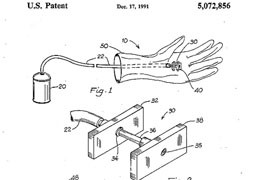Cronkite News has moved to a new home at cronkitenews.azpbs.org. Use this site to search archives from 2011 to May 2015. You can search the new site for current stories.
Court: Tucson man no longer entitled to royalties for Spider-Man toy
WASHINGTON – A federal appeals court ruled Tuesday that Marvel Enterprises Inc. no longer has to pay royalties to the Tucson inventor of a Spider-Man web-shooter, after the patent on the toy expired.
A reluctant panel of the 9th U.S. Circuit Court of Appeals upheld a lower court‘s ruling against Stephen Kimble in a published opinion.
In a separate unpublished opinion, however, the court reversed the district court’s rejection of Kimble’s separate claim for breach of an alleged verbal agreement and remanded the issue for consideration.
“The bottom line is, it’s not done yet,” said Kimble, who added that he is considering an appeal to the Supreme Court of his loss on the patent issue.
Kimble invented the toy – which shoots foam string from a wrist strap – in 1990 and was waiting for a patent on it when he shopped it to Marvel’s former president, Lou Schwartz, according to the ruling. Schwartz said the company would compensate Kimble if it used any of his ideas, Kimble said, but ultimately passed on the toy.
But Marvel began manufacturing its own version of a web-shooter, the Web Blaster, shortly thereafter.
Kimble said Tuesday that he only found out after a friend called and “congratulated” him on marketing the toy.
“I saw a commercial for your toy on Nickelodeon. They’re selling it at Toys R Us,” Kimble quoted the friend as saying. “So I go down to Toys R Us and there’s my toy, and they’re selling my toy.”
Kimble sued Marvel in 1997 for patent infringement and breach of contract. He lost the patent infringement claim, but a jury ruled that Marvel violated a verbal contract between Schwartz and Kimble and that the inventor was due royalties on the toy.
A series of appeals followed, but the two sides settled in 2001, with Marvel buying the rights to the patent for $515,000 and agreeing to pay Kimble 3 percent of “net product sales.” The appeals court ruling said that Marvel ultimately paid Kimble more than $6 million in royalties.
But disputes over royalty calculations flared anew in 2006 when Marvel gave Hasbro the right to “produce certain toys related to Marvel characters.” By that time, new iterations of Web Blaster were being produced and it was also being packaged with other toys.
Kimble sued and Marvel countersued. A magistrate judge found that under a 1964 Supreme Court ruling, Brulotte v. Thys Co., Kimble was not entitled to royalties after the patent’s 2010 expiration date.
The district court ruled that the 2001 settlement between Marvel and Kimble was a “hybrid agreement” made with leverage from patent rights and “transferred inseparable patent and non-patent rights.”
In a “very abbreviated nutshell,” Kimble said, the court said “the patent has expired, so you’re done.”
Kimble appealed.
But while it said the Brulotte ruling is “counterintuitive and its rationale is arguably unconvincing,” the circuit panel said it was bound by the Supreme Court’s authority. It “reluctantly applied the rule” and upheld the lower court.
David Fleischer, who argued the case for Marvel, said the purpose of the Brulotte ruling was to give patent holders a monopoly for a limited number of years to “encourage the progress of science.” But limiting the patent allows people to “build upon” the work and make further progress, he said.
But Kimble, who said he is “seriously considering” an appeal, called Brulotte “bad law.” He said it tied the hands of the circuit court judges.
“You know it’s a bad law, I know it’s a bad law, let’s change this law,” Kimble said.
“We are seriously considering going to the Supreme Court and asking that they change the Brulette law. At one time it may have been a good law, but it is no longer good law,” he said.








